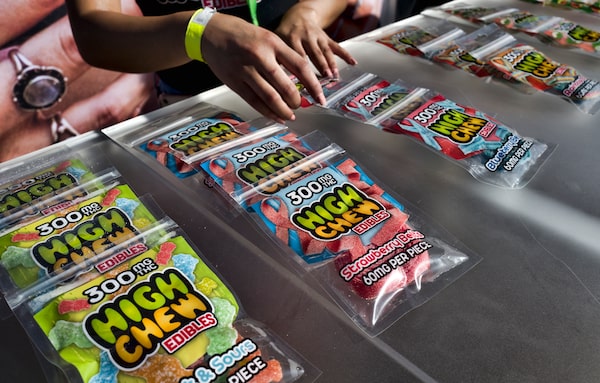Part of cannabis laws and regulations
Canada’s plan to strictly limit the potency of edible cannabis products is aimed at protecting people who may accidentally consume them, but the new rules will not discourage some consumers from resorting to the black market, critics say.
Crushing the sizable underground trade in cannabis was a core priority for the Liberal government when it legalized cannabis last fall. On Friday, Ottawa announced a “limited selection” of next-generation cannabis products such as edibles will “gradually” hit retail shelves no earlier than mid-December.
Edible cannabis, whether foods or beverages, will have a cap of 10 milligrams of tetrahydrocannabinol (THC) – the psychoactive substance that produces the “high” – per package, according to the rules, Health Canada officials told reporters in a conference call on Friday.

High Chew edibles are shown for sale at the cannabis-themed Kushstock Festival at Adelanto, Calif. (File Photo).Richard Vogel/The Associated Press
Cannabis extracts for inhalation or topicals, such as pot-infused lotions, will have a cap of 1,000 milligrams of THC per package.
These limits on THC were created to curb the damage to people who accidentally consume these products as well as to those who take too much, said officials with the federal department, speaking on background during the technical briefing.
Those dosage caps pale in comparison to what is currently being offered in the illicit market, with dozens of online dispensaries currently selling gummies, for example, that have as much as 80 milligrams per piece. As well, unlicensed dispensaries across the country are offering more potent products to medical marijuana patients who seek out various remedies not approved under Canadian law.
Experts say the underground industry will continue to meet this demand as long as Ottawa does not allow for a wider range of these products.
Jamie Shaw, chief communications and culture officer at publicly traded Pasha Brands, a cannabis firm working with microgrowers in B.C., said legalization has brought less, not more, choice in products for medical marijuana patients and long-time recreational users. This is because retailers must adhere to federal laws that have prohibited edibles, concentrates and creams up until now.
“As we see dispensaries transitioning to legal, we see customers either transition to their [illicit dealer] or online to dispensaries,” said Ms. Shaw, who has long worked with dispensaries catering to medical users.
In 2015, the Supreme Court of Canada ruled that medical-marijuana users have the right to consume the drug in ways other than smoking – such as cookies, lip balm or lozenges – but the government system only provided pills and tinctures in response to this ruling.
Julia Veintrop, general manager at the unlicensed Victoria Cannabis Buyers Club, which has been in operation for more than 23 years, said the regulated market simply does not meet the needs of her nonprofit’s 7,500 members and the new rules for edibles don’t change that.
“There really isn’t a licence that would enable us to keep providing for our members and, as a result, those people would suffer,” she said.
For example, she said, suppositories are not sold on the legal market, but her organization offers five types with doses ranging up to 200 milligrams of THC. They are popular with people who have vaginal cancers, PMS symptoms or those with stomach issues, she said.
The final regulations, which will be formally published in the Canada Gazette on June 26, have been highly anticipated by cannabis-industry players well as food, beverage and other consumer goods companies as they develop products to tap into anticipated demand.
A flurry of companies have announced plans for weed-infused products. For example, Toronto-based Greenhouse Juice Co. said it plans to develop beverages infused with cannabidiol, or CBD, helped by an investment by Canopy Growth Corp.’s venture capital arm. Quebec-based Hexo Corp. has also partnered with alcohol giant Molson Coors to form a joint venture called Truss to make and sell cannabis-infused, non-alcoholic beverages.
These products cannot contain nicotine, caffeine or alcohol. As well, no elements on these products would associate them with alcoholic beverages, tobacco products, or vaping products. All packaging must be plain and child resistant, and must not be appealing to young people.
Whether an edible cannabis product is reasonably considered to be appealing to children would depend on various factors including its shape, colour, flavour, scent and how it’s packaged, a government official said on Friday. The determination of whether a product does violate the guideline will be made on a case-by-case basis, the official said.
With a report from The Canadian Press
 Mike Hager
Mike Hager